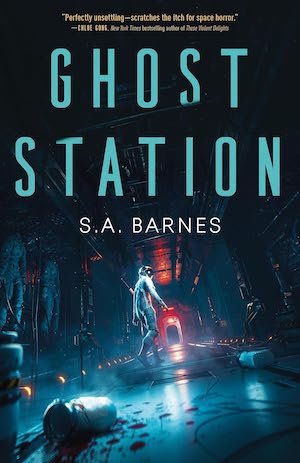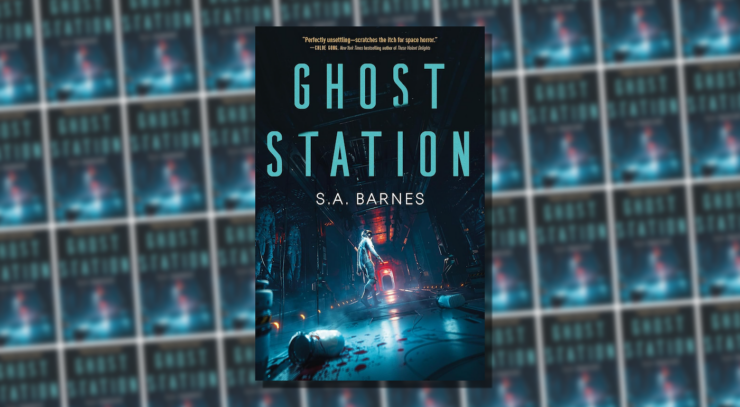The bad news is, space madness is real. The good news is, it can be staved off with iron tablets and proper sleep.
That’s the job of Ophelia Bray, psychologist for the star-spanning Montrose company. She treats workers who spend too much time in space, their circadian rhythms shattered and their nerves frayed by sharing cramped quarters with their comrades, and so are at risk of developing Eckhart-Reiser syndrome (ERS). In low-level cases, ERS can lead to anxiety, depression, sleepwalking, irritation, or substance abuse; in worse cases, it leads to the murder of dozens of people.
But right now, Ophelia has a PR problem. She has her job at Montrose out of spite—the Bray family, of which she’s an erstwhile part, are the magnates of Pinnacle, Montrose’s biggest competitor. And she’s just publicly, humiliatingly, failed to save an important patient from ERS. She wants the chance to prove she can still do good work—and Montrose PR wants her out of their hair. She’s dispatched to join the crew of the Resilience: a research and exploration team whose job it is to survey and sample planets to see if they have any economic value.
They were one of the top-rated teams in the business, except that on their last mission, their systems manager Olberman walked out of their habitation and into a maze of icy, airless caverns. Montrose—and Ophelia—are worried that Olberman’s death was due to ERS and that there could be more undiagnosed cases among the crew; but none of them, from the captain to the pilot to the engineer, want to talk about it. Ophelia is an intruder, taking a dead woman’s bunk and spacesuit, with a famous surname that can do nothing but alienate her.
Besides, there’s a job to do. Lyria 393-C is a unique planet to survey: one of less than a hundred with signs of former intelligent life, the collapsed ruins of a civilization that died out far before humans arrived on the scene. It’s also caught in a perpetual blizzard, with howling snows that reduce visibility to just a few feet in front of you and make landing (not to mention taking off again) nearly impossible. When the Resilience finally manages to set down, they find towers made of smooth obsidian black and piles of overlong alien bones that imply (as might be expected) that the death of their civilization might not have been pleasant.
Ghost Station is a book that’s playing with the subgenre of space horror, taking familiar settings and characters and twisting them into something more. The callousness of Montrose, sending the Resilience to investigate dangerous extraterrestrial artifacts without adequate protection or information about what they might be, is deeply reminiscent of Alien; the book’s cover, featuring a faceless astronaut walking away from blood-spattered boots through a cold and dimly-lit space station, mirrors the claustrophobic, hallucinatory aesthetic of Event Horizon.
Buy the Book


Ghost Station
But the most interesting way the book interacts with its genre is in how it manipulates readers’ expectations as to the exact nature of its horror: what exactly it is stalking the Resilience’s crew and pitting them against each other; what exactly it is that kills their pilot in the dead of night.
Ghost Station cues us from the beginning to be on the lookout for ERS—and in the strained dynamics of the crew, it’s easy enough to find. The commander, Severin, is brusque and emotionless; the pilot, Birch, and the inventory specialist, Suresh, are openly hostile towards Ophelia, although their search for allies in the rest of the crew only leaves them increasingly isolated; and the engineer, Kate, is keeping secrets. Only the scientist, Liana, is willing to attend Ophelia’s therapy sessions and talk candidly about what losing Olberman meant to her… but it’s an openness that leaves her vulnerable. It’s a familiar type of horror story: a collection of fragile individuals in a contained, clinical environment, old traumas and new creating razor-sharp conflicts.
These bubbling tensions among the crew, however, are pushed from the outside as well. The crew avoid Ophelia as best they can by throwing themselves into the archaeological work of unearthing the Lyrians, taking samples from the glittering towers and breaking into their lower floors. The crew takes all the precautions that Montrose advises, of course… but there’s no guarantee that Earth-designed protective suits and decontamination methods will prove any use against what they find. And once they—Ophelia included—begin suffering from strange burn-like rashes that don’t show up on their medical scans, the story changes. Now there’s an invasion from outside, from the unknown and the inexplicable.
It’s a skillfully done reversal—at points perhaps a little telegraphed, if only because Barnes clearly knows the genre so well. Horror is about the unknown, whether that be character motivations or alien influences, and Barnes set up the clashing characters so neatly that I suspected there would be something more, something to upend this careful construction (and there was!).
If you’re a connoisseur of sci-fi horror, Ghost Station is what you’re looking for. It knows what it’s doing, and is able to craft a novel—and thrilling—story within the space it creates.
Ghost Station is published by Nightfire.
Read an excerpt.










